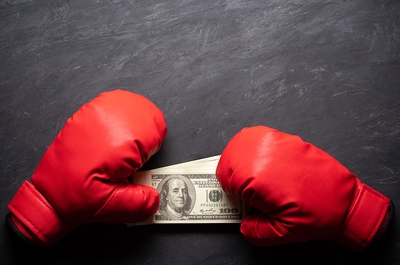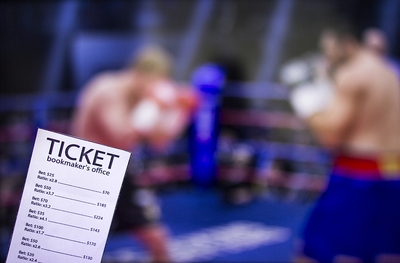 Although gambling and professional sports often have an especially close relationship, this does not necessarily mean sporting stars themselves have the freedom to gamble. In football for example, pros in England and Wales are prohibited from placing bets even on any football related market, let alone a match they are involved in. Players that breach these rules have regularly been fined and/or suspended from playing too, so they are something to take seriously.
Although gambling and professional sports often have an especially close relationship, this does not necessarily mean sporting stars themselves have the freedom to gamble. In football for example, pros in England and Wales are prohibited from placing bets even on any football related market, let alone a match they are involved in. Players that breach these rules have regularly been fined and/or suspended from playing too, so they are something to take seriously.
Equally in horse racing there are very clearly defined rules depending on the level of the action and what role the actor has (jockey, trainer or owner, for example). Over the years various members of the racing fraternity have fallen foul of these regulations and have been punished accordingly.
Rules vary between sports and governing bodies though with some other sports taking a more relaxed stance when it comes to gambling. When specifically looking at boxing, the situation is not so clear-cut with rules varying depending on where the fight is and who is in charge of it. As well as exploring what regulations apply and where, we will consider which approach is best for a sport like boxing.
Boxing And Betting
 Rules that restrict professional sports personnel from betting on an event, or sport, they are involved in are usually in place to help protect the integrity of the sport. For a sport that has long been known to suffer issues with corruption, such as boxing, this is a very important issue.
Rules that restrict professional sports personnel from betting on an event, or sport, they are involved in are usually in place to help protect the integrity of the sport. For a sport that has long been known to suffer issues with corruption, such as boxing, this is a very important issue.
Regulation-breaking bets placed by boxers seem to be a relatively minor issue though and something that rarely makes the headlines. This is because of a couple of main reasons. First is that when fights are fixed it will usually be third parties placing the bets, rather than the boxers themselves and their involvement can be hard to prove. Secondly, some of the corruption in boxing stems from officials and referees rather than the fighters themselves.
So, while the sport may have some issues, boxers failing to abide by rules on betting is not one of them. At least it is not a major issue. At the top end, professional boxers are rich enough that they do not need to bet on the sport, nor fix bouts. Lower down the pecking order we suspect that there may be more widespread issues but certainly compared to other sports it is not something that seems to be a major problem.
Can Boxers Bet On Themselves?

You may think there is absolutely nothing wrong on a boxer betting on themselves to win a fight, if anything it simply shows how committed they are to giving it their best shot. If the boxer consistently bet on themselves, wagering the exact same amount each time, we would be inclined to agree. Should their usual routine stop though, then this does raise eyebrows.
Say for example that a boxer regularly gambles on themselves but on this one occasion they decide not to. This should raise some red flags because it calls into question if they are going to go for it like they usually would. It could, of course be something completely innocent like they simply lack confidence but it does put the integrity of the fight under some scrutiny. Additionally, it gives the boxer’s regular bookmaker some huge insider info that their usually bullish fighter is fearing the worst for this particular bout.
Conversely, imagine a situation in which a boxer never gambles on themselves but for this one headline fight they put a huge sum of money on themselves. Perhaps they are just feeling bold and confident but could there be something more sinister at play? A one-off large wager from a boxer that never usually gambles may be an indication that the other fighter is under instruction to ease-off for the bout. Collusion between fighters, especially at the lower levels, could certainly be an issue. If winning the fight is realistically worth less to either fighter than they can make by betting on it, the appeal of agreeing the outcome and one boxer backing themselves heavily is clear.
Whichever way around you look at it, boxers publicly betting on their own fights would cause a lot of problems.
More Specific Bets
 There are also issues with a boxer placing a bet on a specific outcome, such as for a fourth round knockout. A specific bet like this opens the door to some significant manipulation as a fighter will be incentivised not to throw any big punches for the opening three rounds. This ends up being unfair to punters as they are unknowingly betting on a match which the boxer is effectively trying to rig. There is no guarantee they will be able to get the fourth round KO but the fact that the boxer has a huge financial incentive to box in a certain way harms the integrity of the sport.
There are also issues with a boxer placing a bet on a specific outcome, such as for a fourth round knockout. A specific bet like this opens the door to some significant manipulation as a fighter will be incentivised not to throw any big punches for the opening three rounds. This ends up being unfair to punters as they are unknowingly betting on a match which the boxer is effectively trying to rig. There is no guarantee they will be able to get the fourth round KO but the fact that the boxer has a huge financial incentive to box in a certain way harms the integrity of the sport.
Even in jurisdictions in which boxers are free to bet on themselves, they could well find that they cannot make these more specific wagers. Both the Nevada State Athletic Commission and the Nevada Gambling Control have no regulations preventing a boxer from betting on themselves simply to win a contest. Floyd Mayweather was, however, unable to place a $400,000 bet on himself that predicted he would win his clash with Conor McGregor within 9.5 rounds. He was prevented from doing so as the bookie, M Resort Casino, had doubts whether any bet other than a straightforward ‘to win’ would be legal.
Some jurisdictions certainly lack clarity with what is permitted when it comes to alternative markets but some simply operate with a blanket ban. British boxing for instance forbids fighters from betting on themselves in any capacity as per British Boxing Board of Control (BBBofC) regulations. This covers absolutely all bets whether a simple to win bet or to win via a certain way or in a certain round. Following a fight with Audley Harrison in 2013, David Haye found himself under investigation for supposedly betting on himself to win via a third round knockout.
This is exactly what happened too after an incredibly uneventful opening two rounds. The investigation eventually accepted Haye’s version of events, which were that he did not “place a bet on himself, directly or indirectly”. He simply told family and friends that his prediction was that he would win in the third round.
Some of his connections did end up putting money on this outcome as a result, persuaded by Haye’s confidence, but none were under instructions from Haye to place the bet. As such, the London-born fighter escaped any punishment but he would have faced a fine, at least, if found guilty.
Can Boxers Bet Against Themselves?

There are plenty who think boxers should be allowed to back themselves to win but very few will agree that it is okay for them to bet on the opposite outcome. There is a clear conflict of interest when a boxer is set for a big payout upon defeat and it raises huge question marks over the integrity of the fight and in a wider sense, the whole sport. As such, these bets are practically banned across the board and you will very rarely find a boxer willing to put money on their opponent. Some may do so via a third party of course, and this is difficult to police, but boxers do at least avoid placing the bet themselves.
We do have one known instance though of a boxer who did exactly that, at the Olympics Games no less. Irish competitor Steve Donnelly placed two bets on Mongolia fighter Tuvshinbat Byamba to beat him in their last 16 clash. This was in addition to six other bets that Donnelly had placed while ‘bored’ at the Olympic village. Despite the two wagers, the Irish boxer won the fight on a split decision. He told the IOC (International Olympic Committee) that he never had any intention of losing the bout and he only placed the bet to give him some sort of consolation prize if he lost.
Satisfied with his explanation, and also aware that Donnelly did not read the anti-betting documents he signed, the IOC only handed him a slap on the wrists. His punishment amounted to a verbal reprimand and being asked to take part in an integrity education program. Had he lost the fight then the Irishman may well have ended up more severely punished, but as it was, his competitive performance spared him anything too draconian.
Can Boxers Bet On Other Fights?

Although Premier League footballers cannot bet on matches taking place on the other side of the planet, boxers are not so restricted when it comes to gambling. Should a boxer wish to gamble on a fight they are in no way involved in, then this is unlikely to cause them any problems. This is not to say that it would remain entirely free of investigation though, in more unusual circumstances. If it turns out Wladimir Klitschko bet on his brother, Vitali, to lose a fight, then this would not pass without questions being asked, for example.
In normal circumstances though, the only real exception is at the Olympics, which takes a hard stance against gambling. During the 2016 Games, three boxers, including the aforementioned Steven Donnelly were reprimanded for betting on other fights. Anthony Flower placed bets on seven fights including one involving in a British teammate, while Michael Conlan placed a series of low-stake wagers during the opening weekend. IOC rules prohibit athletes betting on another Olympic event but as all three were simply oblivious to the rules, rather than involved in match fixing, none faced any real punishment.
Outside of the Olympics though and boxers are largely free to stake whatever money they like on other fights without risking any trouble. Chris Eubank Jr proved this when sharing with the world a bet of £10,000 he placed on Canelo Alvarez to knock out his old foe, Billy Joe Saunders. Not only did Eubank double his money from the bet (which was promised to go to charity) but he no doubt enjoyed winding Saunders up a little too!
Should Boxers Be Allowed To Bet On Their Own Fights?
 Boxers may or may not be able to back themselves to win, depending on where the fight is and who the governing body is. Many feel, however, that it would serve boxing better to have a more uniform approach to the matter and one that prevents boxers from placing any bets on any fight they are involved in. We have already discussed some of the problems of a fighter inconsistently betting on themselves to win but there can be issues with fighters who gamble consistently too.
Boxers may or may not be able to back themselves to win, depending on where the fight is and who the governing body is. Many feel, however, that it would serve boxing better to have a more uniform approach to the matter and one that prevents boxers from placing any bets on any fight they are involved in. We have already discussed some of the problems of a fighter inconsistently betting on themselves to win but there can be issues with fighters who gamble consistently too.
Should a boxer go through a bad run of form and lose several fights in a row, it is possible that their failed bets could lead them into debt or a precarious financial position. This creates the perfect environment for corruption to occur as the boxer will be desperate for some extra cash. It is easy to imagine such a fighter cutting a deal to throw their next bout, or perhaps more likely engaging in spot-fixing or selling off insider info to some underground bookies.
